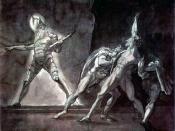Hamlet's Tragic Flaws
Thesis Statement
Hamlet is an endearing character with his own remarkable qualities; however his inability to act upon his convictions leads him to his tragic demise.
Introduction and Background of Tragic Flaw
In Aristotle the "tragic flaw" is hamartia, and critics continue to debate what precisely he means by it. Technically it should mean a mistake of judgment, "missing the mark." However, the way he uses it and the fact that he uses it of Oedipus in Sophocles' play suggests rather that it is an aspect of character-that certain men characteristically make certain mistakes. Hamlet is then thinking about the hidden flaws in men, and especially about Claudius, since he is the one who called for the drunken revel, when the Ghost appears to reveal the hidden truth of his death: Claudius seduced his wife and killed him. The act ends with Hamlet's assumption of an "antic disposition."
He has realized that one may "smile and smile and be a villain." He has also corrected his friend's skepticism: "There are more things, Horatio, / Than are dreamt of in your philosophy" (174-75). Claudius is a villain but a hypocrite; to seek his vengeance, Hamlet himself will have to pretend to be what he is not: mad.
What does the act break here signify? Most obviously it marks the passage of time: "Laertes has time to settle in Paris, Hamlet to show in full his antic disposition, Rosencrantz and Guildenstern to be recalled to Elsinore and the ambassadors to go and return from Norway" (Brown, 2001). We certainly see the shape of the first act: the Ghost appears in the first and last scenes to make his demand. He has risen up from the earth to confirm his son's worst suspicions and to demand of him action.


